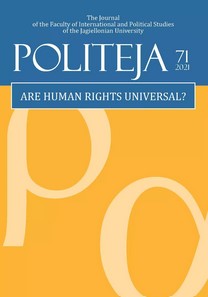UNIVERSAL HUMAN RIGHTS? HISTORICAL AND CONTEMPORARY COMMENTS
UNIVERSAL HUMAN RIGHTS? HISTORICAL AND CONTEMPORARY COMMENTS
Author(s): Bogdan SzlachtaSubject(s): History of Law, Human Rights and Humanitarian Law, Modern Age, Philosophy of Law, Politics and law
Published by: KSIĘGARNIA AKADEMICKA Sp. z o.o.
Keywords: natural law; law of nature; natural rights; human rights;
Summary/Abstract: The concept of human rights, supposedly of universal importance, is usually derived from the tradition referred to as “Western”. Although the “classic approaches” – Greek, Roman and Christian, refer to the norms of natural law, making them the basis or limits of the rights of individuals, in modern approaches the relation is reserved, in the manner that rights become primary to norms. Although liberals of the 17th and 18th centuries consider the law of nature as a tool for their protection, starting from the 19th century, the rights (already called human rights) have been increasingly perceived as positive abilities to articulate own, subjective preferences of individuals. This evolution needs to be accounted for in the studies carried out by representatives of various cultures, since the comprehension of an individual (and even a “human person”) as an essentially culturally unconditioned one, is its ineradicable element.
Journal: Politeja - Pismo Wydziału Studiów Międzynarodowych i Politycznych Uniwersytetu Jagiellońskiego
- Issue Year: XVIII/2021
- Issue No: 71
- Page Range: 3-17
- Page Count: 15
- Language: English

